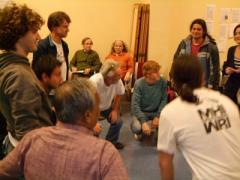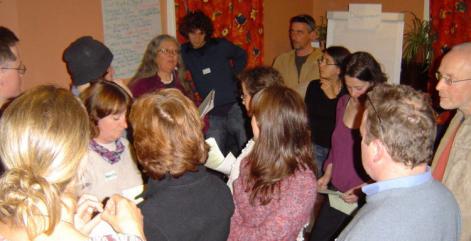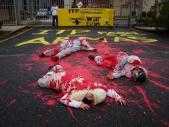2008 Annual Report of the Nonviolence Programme
2008 has been a fruitful year for WRI's Nonviolence Programme, bringing important developments in the main areas of the programme's work. The programme's main aims are to strengthen and deepen understanding of nonviolence, nonviolent strategies, and nonviolent campaigning, and to develop and provide tools and support to groups using nonviolence. The following were the main projects for 2008.
International Nonviolence Training Exchange
The main project of the programme in 2008 was the International Nonviolence Training Exchange which took place in Bilbao, in the Spanish Basque Country during the last week of October. Present were people from more than 15 countries, from Central and East Europe, Middle East, North and South America, South and East Asia. It was a place for practical exchange on how we work in nonviolence training. Looking at the challenges faced in different contexts but also what unifies us.
Almost all of the participants came representing local grassroots groups working nonviolently in their own communities. Perhaps two session particularly stand out: one on de-escalating tensions during nonviolent action, and other on Gender and Nonviolence where participants exchanged different training exercises as well as exploring how gender influences our work as trainers.
For the future it was suggested to continue having these events, by having regional and thematically exchanges.
Handbook for Nonviolent Campaigns
WRI's Handbook for Nonviolent Campaigns is now ready for the printer. This has taken a lot of staff time to prepare. It includes sections on how to plan strategic nonviolent campaigns, how to prepare for nonviolent actions, tools for working in groups, the connection between gender and nonviolence, a series of stories from the work in nonviolence from groups all over the world, a long list of practical training exercises, and a list of related resources. A number of these resources were 'road-tested' in early October when the WRI Nonviolence Programme conducted a nonviolence training with Irish activists, hosted by WRI's affiliate INNATE. We plan for these resources to be used by grassroots groups around the world,. There is already interest in producing Spanish, Russian, Hebrew, Korean and Turkish language versions of the handbook.
The handbook has a web and printed version. The plan is to continue to regularly update the web version which can be access from: http://wri-irg.org/node/3855. For buying copies of the printed version please contact the WRI office at info@wri-irg.org
Trainings
As well as the training already mentioned in Northern Ireland, the Nonviolence Programme also gave trainings during the European Peace Action Forum in Sweden. With the launch of the Handbook for Nonviolent Campaigns, we want to provide more trainings, building up from the process of producing the handbook.
For next year we have already secured the funding for a workshop with Russian and Chechen activists in St. Petersburg, supporting the work of the House for Peace and Nonviolence there. The Nonviolence Programme will also cooperate in the coordination of trainings for the actions against the NATO summit in April of 2009.
European Coordination of Radical Nonviolent Antimilitarist Groups
The coordination at a European level of radical groups doing nonviolent antimilitarist actions has seen real successes during this year. WRI and specifically the Nonviolence Programme has played a crucial role in stimulating this process. The main three events of this loose network were:
NATO Game Over:
During the last week of March, at the invitation of WRI's Flemish affiliate – Vredesactie -- more than 1,000 people (300 from outside Belgium) took part in a civil disobedience action at NATO's headquarters in Brussels. Some 500 people were arrested and news of the action was reported by media from most European countries.
Following the action, there was a two days seminar co-hosted by Vredesactie and WRI. This was a place for analysing the role of NATO and the EU in military interventions around the world and for planning next steps for the work of radical antimilitarist groups in Europe.
For a full report on NATO Game Over you can go to: http://vredesactie.be/page.php?id=154
European Peace Action Forum:
Using the occasion of the European Social Forum that took place in September in Malmo, Sweden, WRI helped to organise a specific forum for radical antimilitarist groups. This forum was hosted by the Swedish antimilitarist group Ofog. The forum had its own programme looking at issues of militarism and nonviolence. The forum was a complete success in terms of number and diversity of participants as well as for the outcome from the different sessions and the connections made informally. Another of these gatherings is now scheduled in April 2009, attached to the activities against the 60th anniversary of NATO.
For a full report on the European Peace Action Forum you can go to: http://wri-irg.org/node/5739
War Starts from Europe – Decentralised Day of Action:
The final activity of this loose network was a decentralised day of action that took place around 14-15 of November against European military infrastructure. Nonviolent actions occurred in a number of countries, aiming especially at military institutions, infrastructures and corporations. The day of action was a way to work as a network but locally.
For a full report on the day of action you can go to: http://wri-irg.org/epublish/26/291
The next steps of this regional coordination primarily focus on the summit for the 60th anniversary of NATO, which will take place in Strasbourg (France) and Baden Baden (Germany) on the 3-4 April 2009. Activities being prepared include a mass demonstration in Strasbourg on 4 April; a conference providing criticism and alternatives, civil disobedience and a camp for activists.
Global Initiative Against War Profiteers
The Nonviolence Programme continues to publish War Profiteers' News (http://wri-irg.org/publications/war_profiteers), an electronic newsletter, on war profiteering. This has reported on nonviolent action against corporations profiteering from war. Special features are the Campaign of the Month, where we highlight the work of a campaign, and the War Profiteer of the Month where we denounce a specific corporation which is profiteering from war.
As part of this work, the programme coordinated a workshop on war profiteers during the European Peace Action Forum. The workshop had representatives from various European countries working on this field. This networking was also strengthened by the participation of the staff worker at the annual meeting of the European Network Against Arms Trade (ENAAT) in Oslo, Norway.
Future work of the initiative includes, a Wiki page (a web collaborative tool) on campaigns against war profiteers. If you go to that page you will find profiles of as many campaigns as we know about. So please send us information on campaigns. Once we launch the Wiki, the idea is for the network to continue updating it. We know there are a lot of resources on the companies, but there is much less on the campaigns
opposing them.
International Conference in India, January 2010
Preparations are underway for the next WRI international conference, to be held in India in January 2010. Advocates of nonviolence, and especially those linked with WRI, have always stressed the twin positive objectives of strengthening community while also transcending the national boundaries that divide us. The theme of this conference seeks to make some very specific connections - "Linking local livelihood struggles to global militarism". Global militarism is a global menace, but also a threat to many communities -- whether it's war itself, or preparations for war including building bases, mining for weapons materials, or testing weapons systems or training with them. India, which many of us think of as the country of Gandhi, is also an industrial and technological power and a regional military power. This participatory seminar will bring together campaigners and researchers from all over the world to analyse the role of states and multinational corporations in depriving local communities of their sources of livelihood, so strengthening the transnational campaigns needed to stop them.
Fundraising
The financial aspect of the programme continues to be difficult. We have not secured funding for 2009, and WRI doesn't have financial reserves. This means that if we don't raise funds, the programme will have to be cut back or even close down. For 2008 the funding raised for the International Nonviolent Training Exchange in Bilbao gave incredibly a substantial amount for organisational overheads. This is not usually the case with grant funding: normally the grant is consumed almost entirely in the project itself. Therefore the Nonviolence Programme relies on the income from special appeals to individuals. Even with the funding from the Training Exchange and the generous donations of supporters, in 2008 only half the programme's costs were met. We therefore are appealing to supporters of the work of the programme to contribute to making it sustainable. Please help by supporting the programme financially, personally, through a group or through getting more people to support it as well.



Add new comment